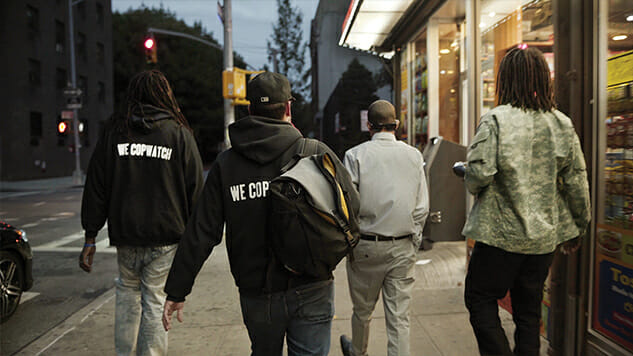
Five thousand innocent bystanders have been accidentally killed by police activity since 1979, according to HG.org. That might seem like a lot, but in just one year—from August 9, 2014 (the day Michael Brown was gunned down in St. Louis) to August 9, 2015—1,083 Americans were killed by cops. This dramatic increase in violence leaves us more aware than ever of the hypocrisy running through police policy towards our communities’ ability to document police brutality, something the watchdogs of Copwatch know all too well.
The documentary builds two kinds of characters—ghosts and those haunted by them—and we see plenty of ghosts thanks to the footage shot by the haunted. Presented in the film, brutal viral videos of police killings in the last few years retain the horrifying effect the had when they were disseminated online, but played at volume on the big screen, they make for an unimaginable hell. Watching the videos like that, it’s the closest we will get to possibly understanding the subjects of the film.
Jacob Crawford, an Oakland native shocked at Michael Brown’s killing, relocates to Ferguson and meets David Whitt, who’s been active in the protests there. They found WeCopwatch, an organization aimed to educate the public and generate activism. Joined by the two biggest names in police brutality amateur evidence collection, Ramsey Orta (who filmed New York City’s Eric Garner being overwhelmed and choked to death) and Kevin Moore (who captured the screaming final public moments of Baltimore’s Freddie Gray before his death), the four build an uneasy friendship and organization rooted in loss.
The film’s often shaky camera, bright police car flashers and flashlights, and rabble-rousing subjects make it quite clear that both parties are equally antagonistic. The police’s wish to provide a well-lit area can also easily be turned into a way to obscure and blind to the truth. Obstruction is always in the front of the doc’s mind, as police officers push cameras further and further back or as videographers warily explain to each other how close is too close. Some videographers are more aggressive; some police are more cooperative. The battle of expectations is what’s documented here.
Seeing a pilgrimage of neighborhood filmmakers to a crime scene engages us with Copwatch’s pursuits on a higher level. As Kevin Moore says: There’s not only a need for safety and justice, but a proof of existence for those who may feel like “fuck-ups” (as Moore says) in a world whose systems refuse to acknowledge them. On the social side of things, Vine held a similar anthropological place in many of these communities, giving opportunity and reassurance to people who may not feel like they get any of that.
But these activists, Orta especially, are never treated as heroes. Orta’s criminal charges, after his fame gained from filming Gray’s death, make up most of the film, his response teary but ultimately accepted. Director Camilla Hall is attentive to the media’s declaration of police payback or that Orta was set up, but through smart editing and the presence of an intense, pained Orta, she never has to deny the charges. It would have helped had the prosecution been interviewed instead of just Orta’s defense attorneys (if that was legally allowed), because leaving his crimes as victimless feels like a smoothed-over airbrushing that is everything the rest of the documentary is not. The film isn’t here to exonerate him or damn him, but humanize him in the context of others who’ve found kinship and purpose through their grief.
Community activism is charged by action, otherwise it’d be community passivity, but Copwatch does best when going back to the source of activism’s power. Blossoming friendships following loss are everything that memorials to those lost can and should be; people should bond over food, home repairs and making fun of the white guy (Crawford) who misremembers a Tupac song. What comes from these relationships (either between activists or between activists and police, as we see in an ending conversation) is the joint effort towards accuracy and accountability required to reach mutual goals. This is the angriest, loudest way to go about peace, love and understanding—but it’s not wrong.
Director: Camilla Hall
Starring: Jacob Crawford, Kevin Moore, Ramsey Orta, David Whitt
Release Date: Premiered at the 2017 Tribeca Film Festival
Jacob Oller is a writer and film critic whose writing has appeared in The Guardian, Playboy, Roger Ebert, Film School Rejects, Chicagoist, Vague Visages and other publications. He lives in Chicago, plays Dungeons and Dragons, and struggles not to kill his two cats daily. You can follow him on Twitter.